Search Warrants & Cell Phones
The importance of our cell phones has become paramount in today's society. Our phones contain more than a detailed snapshot of our lives with all the photos, videos, emails and text messages they hold.
Police have found them equally valuable in criminal investigations. As a result, appellate courts across the country are issuing opinions on this frequently litigated issue in courtrooms today- do the police need a search warrant to look at your cell phone.
The Fourth Amendment prohibits the unreasonable search and seizure of a person and their property absent probable cause or a search warrant. A person's cell phone squarely falls within the parameter of the Fourth Amendment. Most law enforcement routinely seek out a warrant to search a cell phone involved in their criminal investigation. However, the situation becomes more complicated for an officer when a crime occurs while they are on duty. Once the officer believes the suspect has committed a crime, does that provide probable cause to search the person's cell phone for evidence of the crime?
The Massachusetts Supreme Court recently addressed this issue. Commonwealth v. Onyx found that a 'nexus' must exist between the crime and the cell phone to justify the search. In the Onyx case, the Court found probable cause did not exist and found the search violated the Fourth Amendment;
Most are not involved in complicated fact scenarios such as the robbery/homicide case above. A more common scenario asked by clients is whether an officer can look at a cell phone when issuing a traffic or speeding ticket. Some have asked if a police officer can look at their cell phone for evidence of a drinking pattern after a DWI arrest.Here, prior to seizing the defendant's cellular telephone, police had received information that the robbery and homicide under investigation had been committed by several people, that the defendant likely was one of those people, and that he owned a cellular telephone. They also knew from experience that coventurers often use cellular telephones to communicate with each other, and that these devices may contain evidence of such communications. According to their own statements, however, the detectives here did not have any "information that [a] cell phone was used in the crime under investigation," nor did they claim that there existed a particular piece of evidence likely to be found on such a device. In essence, then, their decision to seize the defendant's cellular telephone was made because (a) they had reason to believe that the defendant had participated with others in the commission of a robbery-homicide and (b) their training and experience in cases involving multiple defendants suggested that the device in question was likely to contain evidence relevant to those offenses.This, without more, does not satisfy the nexus requirement. "Information establishing that a person [may be] guilty of a crime does not necessarily constitute probable cause to search" or seize the person's cellular telephone, even where the police believe, based on their training and experience in similar cases, that the device is likely to contain relevant evidence. Commonwealth v. Pina, 453 Mass. 438 , 441 (2009). Rather, even where there is probable cause to suspect the defendant of a crime, police may not seize or search his or her cellular telephone to look for evidence unless they have information establishing the existence of particular evidence likely to be found there.
Generally speaking, most searches of a cell phone will require a warrant. However, if an officer asks you for permission to look at your phone and you consent, you have likely waived Fourth Amendment protection. Consent is a topic for another day...
Meanwhile, criminal courtrooms continue to litigate the definition of nexus, probable cause and the overall right to privacy. And cell phones will continue to be more important to some than their vacation days....
Charlotte Criminal Attorney Updates Provided by The Law Office of Carilyn Ibsen PLLC (888)543-2427
Labels: dui-dwi, police-search





